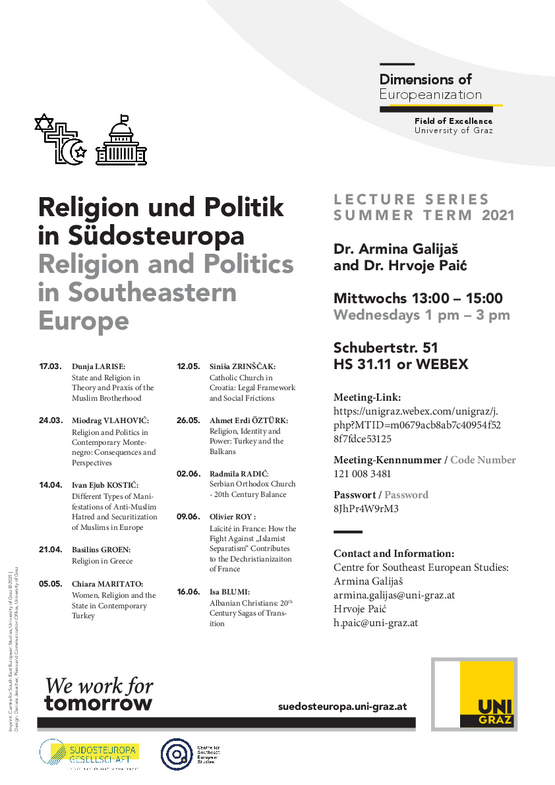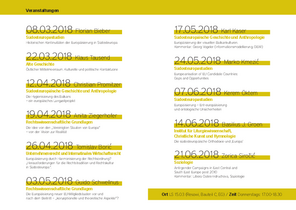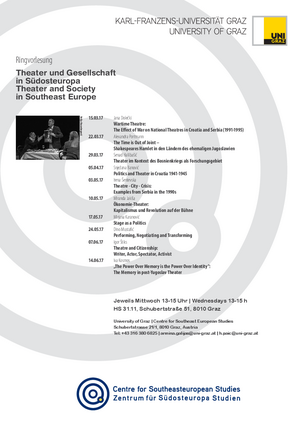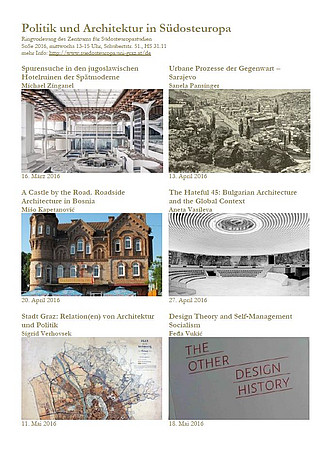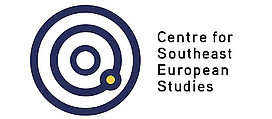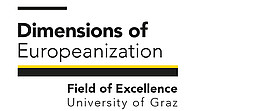Lecture Series
Religion and Politics in Southeastern Europe
This lecture series will explore the topic of reproduction of religions in the context of social transformation in Southeastern Europe. It will investigate the relationship between religions, politics, economics and other ideological social structures, and in doing so, by usage of historical, anthropological, sociological, and political science approaches. In the centre of interest of lecture series are diverse religious content structures, and their historical-political functions in contemporary Southeastern European societies.
Central topics will be different ways of reproduction of religious social imaginations and concepts, as well as crucial content elements of imaginations and concepts in connection to social phenomena like nationalism, authoritarian rule, democracy, (re)configuration of economic relations.
Main focus of lecture series attention will be put on three dominant and most influential religion and religious communities – Roman-Catholic Church, Islam and Orthodox Churches. But, reflected will be also religious communities and theistic social groups (including religious cults) which are in minority and have less social influence.
Nevertheless, as already indicated other socially relevant ideologies will be put into relation to religions and analysed. That concerns primary ideologies including their immanent social imaginations and concepts that are anti-religious and/or allegedly non-religious (like Marxism/Communism), or allegedly neutral toward religions (like Liberalism/Neoliberalism).
Reproductions of religions from so-called Southeastern Europe, or “the Balkans”, will be investigated, but these productions will also be placed in a wider, “European” and global comparative context including consultation of selected research approaches and theorists (beginning with theorists like J.G. Fichte, L.A. Feuerbach and Karl Marx including current modern theorists and theorists form the SOE like Srdjan Vrcan).
The lecture series analyses are primarily theory-driven empirical analyses and in doing so, will be based particularly on theoretical approaches of sociology of religion and critique of religion, with regard to an exploration of religions in its social contexts. Every session will therefore include a theoretical discussion as well as an empirical reflection.
WEBEX Meeting-LinkLink/URL
Meeting-Link: https://unigraz.webex.com/unigraz/j.php?MTID=m0679acb8ab7c40954f528f7fdce53125
Meeting-Kennnummer: 121 008 3481
Passwort: 8JhPr4W9rM3
Bildung und Politik in Südosteuropa
Diese Ringvorlesung untersucht Bildung und Bildungspolitiken im Rahmen von Gesellschaftstransformationen im südöstlichen Europa. Die Frage nach dem Verhältnis zwischen Bildung, Politik, Ideologie und Totalität der südosteuropäischen Gesellschaften wird unter Einbeziehung primär von historischen, soziologischen und politikwissenschaftlichen Ansätzen gestellt. Im Zentrum der Ringvorlesung stehen unterschiedliche ideologische Strukturen und gesellschafts-politische Funktionen der Bildung in den zeitgenössischen Gesellschaften in Südosteuropa. Thematisiert werden unterschiedliche Bildungspolitiken und Bildungsbereiche, vor allem in Bezug auf Hochschulwesen und Forschungsinstitute. Untersucht werden Bildung und Bildungspolitiken in dem sogenannten Südosteuropa bzw. „Balkan“. Gleichzeitig werden die relevante Phänomene in einem breiteren, „europäischen“ und globalen Kontext komparativ reflektiert. Die Lehrveranstaltung bewertet besonders stark theoriegeleitete Sozial Forschung und dementsprechend basieren die einzelne Vortrage an ausführlich dargestellten sozialwissenschaftlich theoretische Ansätzen – wie z.B. Feldtheorie von Pierre Bourdieu - hinsichtlich einer Untersuchung von Hochschulwesen im gesellschaftlich-politischen Kontext. In diesem Sinne wird jede LV-Einheit sowohl eine theoretische Diskussion beinhalten.
Design and Society in Southeast Europe
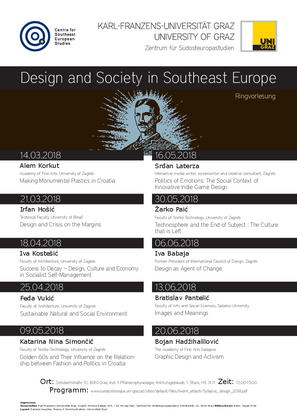
This lecture series will explore the topic of reproduction, esthetics and functions of design in the context of social transformation in Southeastern Europe. It will investigate the relationship between design, politics and society by way of historical, sociological, art history and political science approaches, focusing on the diverse ideological structures, aesthetics and historical-political functions of design in contemporary Southeastern Europe.
Design defined as industrial design, graphic design, visual design and performance art design is often concerned with changing - or conserving - the socio-political system via changing/conservation of everyday life of individuals and collectives.
A particular subject of discussion will be those aspects of design that cover central socio-political themes, creating or reflecting relevant public debate. Design productions from so-called Southeastern Europe, or “the Balkans”, will be investigated, but these productions will also be placed in a wider, “European” and global comparative context including consultation of selected design schools of thoughs and theorists (z.B. Bauhaus, De Stijl, Adolf Loos, Piet Mondrian, Le Corbusier, Louis Sullivan, Georg Nelson und Nigel Cross).
The lecture series will focus particularly on theoretical sociological approaches, with regard to an exploration of design in its social context. Every session will therefore include a theoretical discussion as well as an empirical reflection on social developments.
Europeanisation processes in Southeastern Europe
The lecture serious will reflect critically on the importance of Europeanisation processes in Southeeastern Europe. Europeanisation is a key concept in explaining the transfer of laws and institutions from the EU towards countries aspiring the union and in its neighbourhood. Policy makers and academics have long understood this process of transfer as a key instrument in promoting liberal democratic reforms in Soutehastern Europe and other regions. However, this process has been in crisis in recent years. This crisis is based on the weakening pull of liberal democratic ideas not just in the Southeast European periphery, but also in core states. In addition, the institutions and mechanisms transferring these norms, institutions and rules have weakened. Based on this crisis, the lecture series advances a more critical understanding of the concept, bringing in historical depth and other disciplines to describe the width of the process. This critical Europeanisation approach acknowledges that the transfer and negotiation has been taking place for at least two centuries and occurred in multiple waves. Through an interdisciplinary perspective, the class intends not just to shed light on the recent crisis of Europeanisation, but also explore the concept critically to reflect on how the concept has been re-producing power-relations and is often based teleological assumption.
It thus speaks to a larger debate on the global diffusion of norms and ideas. In doing so, it plans to contribute to the evaluation of a critical approach to area studies
Theater and Society in Southeast Europe
This lecture series will explore the topic of theatre in the context of social transformation in Southeastern Europe. It will investigate the relationship between theatre, politics and society by way of historical, sociological, literary and political science approaches, focusing on the diverse ideological structures, aesthetics and historical-political functions of theatre in contemporary Southeastern Europe. Political theatre explores complex social structures and the struggle for social change, and it often leads to controversy and fierce public debate. Theatre is often concerned with changing - or conserving - the socio-political system: to this end, diverse structures and forms of expression may be used in order to support and/or scrutinize the development of national statehood, capitalism, democracy or equality.A particular subject of discussion will be those aspects of political theatre that cover central socio-political themes, creating or reflecting relevant public debate. Theatre productions from so-called Southeastern Europe, or “the Balkans”, will be investigated, but these productions will also be placed in a wider, “European” and global comparative context. Due to the lecture’s collective nature and “live” character, its topics of exploration will relate directly to the “real world” and will touch on real people and life experiences. The lecture series will focus particularly on theoretical sociological approaches, with regard to an exploration of theatre in its social context. Every session will therefore include a theoretical discussion as well as an empirical reflection on social developments. Theoretical discussions and empirical insights will be explored in more depth in the complementary seminar “Politics and Theatre in Southeastern Europe”, by way of a theory-led exploration of specific “real-life” examples of the relationship between theatre and society.
Politics and Architecture in Southeast Europe
This interdisciplinary lecture series examines the genre of architecture through the framework of social transformations: the question of relations between architecture, politics and ex-Yugoslav societies will be answered by including approaches from historiography, sociology, literary sciences and political sciences. The lecture series focuses on the various content structures as well as on social and political functions of architecture in contemporary post-Yugoslav societies. The elementary proposition is to explore whether architecture offers a significant pool for the scientific research of state models, state myths, national identities, social relations, forms and relations of power and social ideologies. Architecture contains specific forms of knowledge over state and society and partly manifest political discourse. Architecture often aims to change/to preserve political or social systems. In doing so, the diverse content structures and forms of expression are used to reflect and to question the evolution of (nation-)statehood, capitalism, democracy, equality as well as the ex-Yugoslav wars.
Film and the Dissolution of Yugoslavia
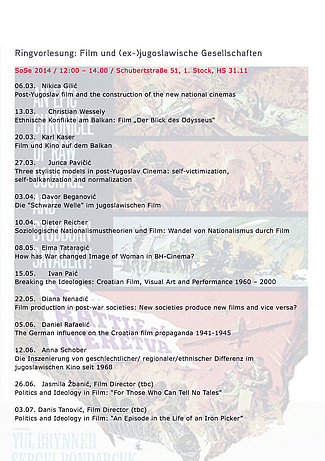
This interdisciplinary lecture series examines the genre of film through the framework of social transformations: the question of relations between film, politics and ex-Yugoslav societies will be answered by including approaches from historiography, sociology, film and media sciences, literary sciences and political sciences. The lecture series focuses on the various content structures as well as on social and political functions of film and film productions in contemporary post-Yugoslav societies. The elementary proposition is to explore whether film and film productions offer a significant pool for the scientific research of state models, state myths, national identities, social relations, forms and relations of power and social ideologies. Films contain specific forms of knowledge over state and society and partly manifest political discourse. Films and film producers often aim to change/to preserve political or social systems. In doing so, the diverse content structures and forms of expression are used to reflect and to question the evolution of (nation-)statehood, capitalism, democracy, equality as well as the ex-Yugoslav wars.

